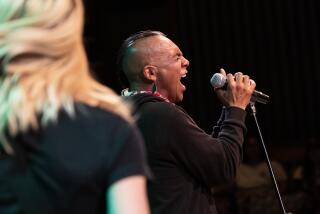He dropped out to run with a Rogue element
- Share via
IT’S a conundrum for middle-class creative types: You go to college for an education so you can get a job that pays you enough to buy a house so you can have a family and start the cycle all over again for your children. Or you opt out and do what you love, hoping you won’t land in the gutter.
Zach Schwartz was 10 years into option No. 1. He went to college. He got the well-paying job. He looked at real estate. And he was miserable.
So he did what any self-respecting 28-year-old with a guitar and a bunch of backlogged melodies would do: He left his job and formed a band.
Schwartz is now Zach Rogue, founder and lead singer of the Bay Area quartet Rogue Wave, a group making cottony-soft dream pop with just enough oomph to kick you in the pants rather than lull you to sleep. On the new “Descended Like Vultures,” the group’s second record on Sub Pop, lilting orchestral harmonies are skewered with artful blasts of electric guitar, and simple acoustic melodies swell to dense and pummeling waves that build with each refrain.
“There’s a sense of foreboding on a lot of the songs,” said Rogue, now 31. “There’s a sense of warmth but a bit of paranoia in the ambience and the mood and the way we put them together and their dramatic nature.”
The group picked up this mood on the road, said Rogue, who wrote most of the lyrics and melodies to the songs before the group went on various tours supporting bands with similar dynamic ideologies -- bands such as TV on the Radio and a label mate, the Shins.
“Being away from home and [feeling] a sense of alienation, sometimes you comfort yourself by singing something melodic and blanketing it with instrumentation that makes you feel better about living out of a duffel bag,” said Rogue, who until last year had never been on tour with a band but is now slated to open shows for Nada Surf this winter or in the spring.
A frustrated musician
THREE years ago, Rogue was a drone at a San Francisco software development firm who’d had enough of 80-hour workweeks and putting his musical dreams on hold for a paycheck. The only time he played his songs was “at 2 in the morning, feeling sorry for myself that I was not happy. I felt like an old man, killing myself to do work that was meaningless to me.”
Then he was laid off. Within days, he had disappeared into a friend’s basement to lay down the bones of 25 songs on a four-track recorder, singing out his ideas over an acoustic guitar and a beat-up church organ. He sent them to a producer friend in New York, who invited him to record the songs in a proper studio. The result was “Out of the Shadow,” a lo-fi sampler of textured, time-traveling pop in the singer-songwriter vein.
The record, released on Rogue’s own Responsive Recordings label in 2003, was remastered and released on Sub Pop in July 2004.
Originally, Rogue Wave was a one-man show. But playing coffee shops and open-mike nights in the Bay Area, Rogue realized he couldn’t re-create the textures of his recorded music on stage. He decided to build a band.
A posting on the Craig’s List website turned up Pat Spurgeon and his musician friends Gram LeBron and Evan Farrell.
“Descended Like Vultures” benefits from the added musicians, all of whom play multiple instruments. In addition to the usual guitar, bass and drums, the songs include organ, viola, xylophone, trumpet, autoharp, chimes, even a bowed saw blade. They’ve contributed to a strong showing in the alt-rock world -- two weeks ago “Descended” was the second-most-added album on the CMJ New Music chart, behind only the latest Fiery Furnaces recording.
“We had everything we owned and then some all laid out ... and it was just a free-for-all,” Rogue said of the recording process. “It was this laboratory, and we’d tackle one song at a time. It wasn’t arbitrary, but it was definitely loose.”
Rogue’s overarching philosophy: Don’t restrict creativity by limiting band members to a single instrument.
“I wanted it to be raw and human,” he said, “and I think that comes with a sense of freedom and spontaneity.”
More to Read
The biggest entertainment stories
Get our big stories about Hollywood, film, television, music, arts, culture and more right in your inbox as soon as they publish.
You may occasionally receive promotional content from the Los Angeles Times.








